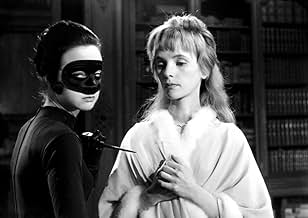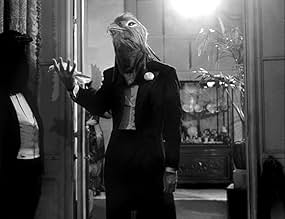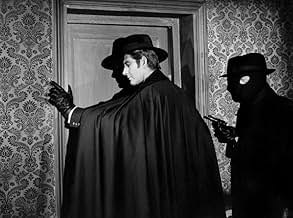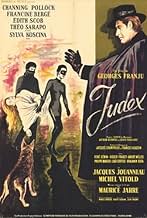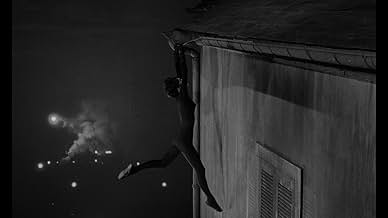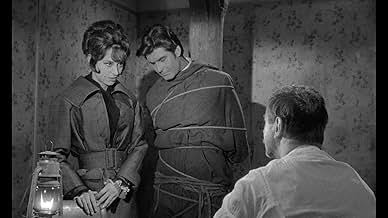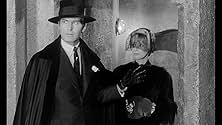Judex
- 1963
- Tous publics
- 1h 38m
IMDb RATING
7.0/10
3.1K
YOUR RATING
After abducting a corrupt banker to make him pay back the people he swindled, a conjuring vigilante must rescue the man's daughter when she is kidnapped by the scheming family governess.After abducting a corrupt banker to make him pay back the people he swindled, a conjuring vigilante must rescue the man's daughter when she is kidnapped by the scheming family governess.After abducting a corrupt banker to make him pay back the people he swindled, a conjuring vigilante must rescue the man's daughter when she is kidnapped by the scheming family governess.
Featured reviews
I never had the opportunity to catch up with this one during my childhood and, for a long time, I had to make do with an intriguing still of the lead character in a large bird mask and holding what appears to be a dead dove. Three years ago, I managed to get hold of a VHS copy duped from what, reportedly, is the only French-language version (an extremely fuzzy 16mm print with barely-legible English subtitles) in existence! Its dire condition had affected my initial judgment and I didn't enjoy the film as much as I hoped I would. Then, two years later, Flicker Alley released the original 12-episode Silent serial of 1916-17 by Louis Feuillade (whose length totals over 5 hours) and I decided to try the Franju film again as a companion piece; this time, I was determined to overlook the deficiencies of the print and just go along for the ride - and, sure enough, it proved to be a much more rewarding experience! This third viewing, then, came by way of an Italian-dubbed 'variant' I recorded off TV which is in much better shape and, despite being apparently trimmed (95 mins. against the official 104), I opted to keep it as the former is a real chore to sit through!
Anyway, much as I admired the already wonderful Feuillade version (which, for the record, I also rate ***1/2), I found the later film - to my mind, an immensely satisfying compression of it - to be even superior because of its genuine touches of poetry and magic, even surrealism (such as the afore-mentioned costume party scene in which Judex - already hiding his true identity under an alias and his features behind layers of make-up - turns up donning a symbolic pigeon mask). In fact, the title role is played by real-life magician Channing Pollock which allows his celebrated act to be cleverly incorporated into the narrative!
I would venture to say that Franju's JUDEX is one of the best remakes ever made - fascinating, exciting and imaginative. The timing of its release (coming immediately prior to the espionage boom of the 1960s) ensured that the film also be viewed as a fond farewell to the days of old-fashioned crime (though gadgetry - soon to go overboard, i.e. when the James Bond extravaganzas descended to the level of a comic-strip - is still present, such as the mirror which allows Judex to peek at his captive and even communicate with him by writing on the glass panel itself).
For all his limitations as an actor, Pollock displays all the stoicism of the typical superhero and carries a genuine screen presence. Besides, Francine Berge' has to be one of the most captivating villainesses to ever grace the screen - utilizing several disguises in the realization of her evil schemes, none more fetching than the skin-tight black outfit (which she also sports when engaging in the climactic roof-top fight with an equestrienne, played by Sylva Koscina in a splendid cameo). Franju regular Edith Scob, then, is the doe-eyed heroine and there's also amiable support from the characters of the detective Cocantin and a resourceful boy who eventually becomes his sidekick. Another of the film's major assets is a subtly haunting score from Maurice Jarre (the last of eight collaborations with Franju, among them the latter's masterwork EYES WITHOUT A FACE [1960]).
The film - co-written by Jacques Champreux (grandson of Louis Feuillade!) and produced by Robert De Nesle (later associated with the dubious work of Jess Franco!) - is a veritable connoisseur's treat and a sheer delight from beginning to end. Franju later made the similar SHADOWMAN (1974; in which Champreux himself took the lead role!) but, by this time, such escapist fare was strictly old hat and, in any case, the result only worked in fits and starts. Another film in the same vein - which I own on VHS and I've been meaning to catch up with for some time - is the Russian-made 4½ hour Silent serial, MISS MEND (1926).
Anyway, much as I admired the already wonderful Feuillade version (which, for the record, I also rate ***1/2), I found the later film - to my mind, an immensely satisfying compression of it - to be even superior because of its genuine touches of poetry and magic, even surrealism (such as the afore-mentioned costume party scene in which Judex - already hiding his true identity under an alias and his features behind layers of make-up - turns up donning a symbolic pigeon mask). In fact, the title role is played by real-life magician Channing Pollock which allows his celebrated act to be cleverly incorporated into the narrative!
I would venture to say that Franju's JUDEX is one of the best remakes ever made - fascinating, exciting and imaginative. The timing of its release (coming immediately prior to the espionage boom of the 1960s) ensured that the film also be viewed as a fond farewell to the days of old-fashioned crime (though gadgetry - soon to go overboard, i.e. when the James Bond extravaganzas descended to the level of a comic-strip - is still present, such as the mirror which allows Judex to peek at his captive and even communicate with him by writing on the glass panel itself).
For all his limitations as an actor, Pollock displays all the stoicism of the typical superhero and carries a genuine screen presence. Besides, Francine Berge' has to be one of the most captivating villainesses to ever grace the screen - utilizing several disguises in the realization of her evil schemes, none more fetching than the skin-tight black outfit (which she also sports when engaging in the climactic roof-top fight with an equestrienne, played by Sylva Koscina in a splendid cameo). Franju regular Edith Scob, then, is the doe-eyed heroine and there's also amiable support from the characters of the detective Cocantin and a resourceful boy who eventually becomes his sidekick. Another of the film's major assets is a subtly haunting score from Maurice Jarre (the last of eight collaborations with Franju, among them the latter's masterwork EYES WITHOUT A FACE [1960]).
The film - co-written by Jacques Champreux (grandson of Louis Feuillade!) and produced by Robert De Nesle (later associated with the dubious work of Jess Franco!) - is a veritable connoisseur's treat and a sheer delight from beginning to end. Franju later made the similar SHADOWMAN (1974; in which Champreux himself took the lead role!) but, by this time, such escapist fare was strictly old hat and, in any case, the result only worked in fits and starts. Another film in the same vein - which I own on VHS and I've been meaning to catch up with for some time - is the Russian-made 4½ hour Silent serial, MISS MEND (1926).
Franju's evocation of a lost innocent era of French silent cinema is a real gem, and a much neglected film. The film creates an air of gentle menace from the opening scenes featuring a bird-masked magician at a masked ball. We soon learn that he is, in fact, Judex, the legendary crime-fighter. He soon becomes engaged in a battle with a cat-suited female criminal. The plot itself is one-dimensional comic-strip stuff, as the above suggests, but what constantly impresses is the poetic set-pieces Franju sets up, particularly a burglary at a country house swathed in mists. The show is continually stolen by Francine Berge, as the criminal - she seems a not-too-distant relation of Diana Rigg in television's "The Avengers", at least in dress sense - and this highlights a slight problem. The hero, played by American magician Channing Pollock, is bland by comparison, as is Edith Scob's heroine-in-distress. It seems that the bad girls get all the fun! Overall, this is the type of film that doesn't get made any more, yet doesn't seem dated. Franju's more famous "Les Yeux Sans Visage" is, in terms of mood, very similar, as is Cocteau's breathtaking fairy tale, "La Belle Et La Bete". The sixties British horror, "The Haunting", also pulls the same trick of showing little by achieving everything through mood alone. Do try to see all of these if you get the chance.
Ever since Irma Vep wore black tights to carry out her stealthy nocturnal activities as leader of Les Vampires in 1915, the image of the female cat burglar has provided the twentieth and twenty-first centuries with one of their great iconic images.
Georges Franju was drawing upon years of studying silent cinema at the Cinemateque Francais so he knew exactly what he had in mind with this loving recreation of the films of Louis Feuillade - while Julie Newmar was doubtless familiar with at least the pictures of Francine Berge in Franju's film when she took on the role of Catwoman - and so she continues to thrive; with Celine and Juliette along the way.
Georges Franju was drawing upon years of studying silent cinema at the Cinemateque Francais so he knew exactly what he had in mind with this loving recreation of the films of Louis Feuillade - while Julie Newmar was doubtless familiar with at least the pictures of Francine Berge in Franju's film when she took on the role of Catwoman - and so she continues to thrive; with Celine and Juliette along the way.
French remake of a 1914 serial involving a "crime fighter" who uses masks and deception to right wrongs and such. Similar in someways to a more real batman. This remake has Judex-the Latin for judge- going after a banker who swindled people by telling him that if he didn't repay the money he would die. And die he does-or so it appears as Judex spirits the man away and hold him prisoner. From there it gets complicated. Good but unremarkable as a whole mystery/adventure story set in the late 1800's thats perfect for late night viewing since its the sort of thing I used to run across at 2am. Worth a look if you run across it but I don't know if I'd go out of my way to see it.
a decent film. not great, not good, not convincing. seductive for its flavor and for beginning. for the references. and for few scenes. action, drama, justice, the silhouette of good guy are old ingredients and that reduced the surprises. the atmosphere is well , not bad for remind the Edgar Poe's Red Death . but something missing. too predictable, with few characters in wrong places, without a remarkable acting, it is only nice and, maybe, useful for remember the spirit of old French cinema. but, despite the story, it has the sin to seems almost boring. and that could be all. without great virtues or ambitions, it is a decent movie. and that status could be enough for viewer.
Did you know
- TriviaAwarded the Coupe Jean-George Auriol 1963, by the jury's unanimous decision, in France.
- GoofsJust before Cocatin, the private detective, sits down at Favraux's desk, a moving shadow of the boom microphone is briefly visible on the curtains at the top of the frame.
- Quotes
Alfred Cocantin: What's all this about nuns?
- ConnectionsFeatured in Cinéma, de notre temps: Georges Franju, le visionnaire (1996)
- How long is Judex?Powered by Alexa
Details
- Release date
- Countries of origin
- Language
- Also known as
- Fantoma
- Filming locations
- Château-Gaillard, Les Andelys, France(Judex's hideout)
- Production companies
- See more company credits at IMDbPro
- Runtime
- 1h 38m(98 min)
- Color
- Sound mix
- Aspect ratio
- 1.66 : 1
Contribute to this page
Suggest an edit or add missing content

